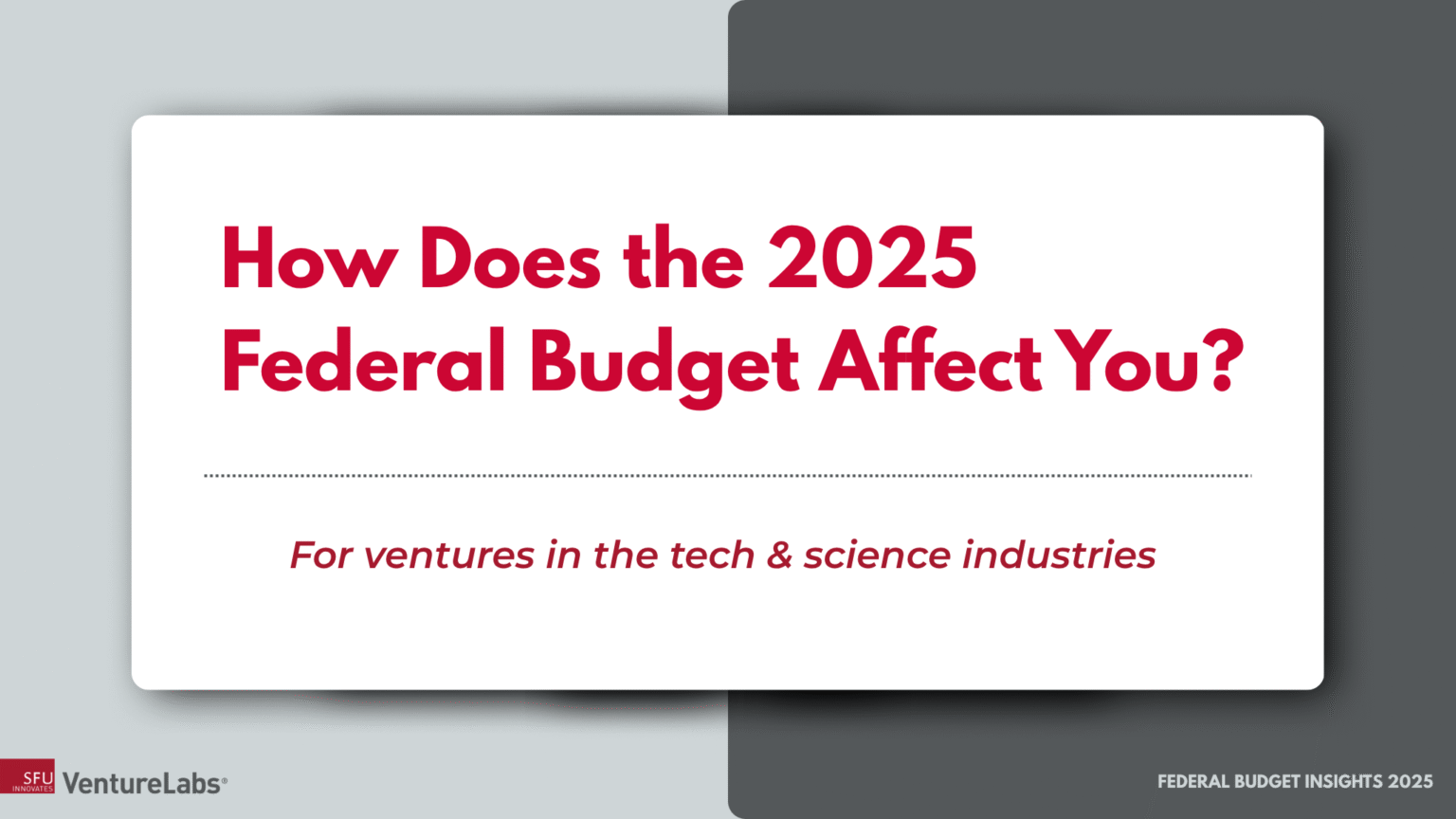The 2025 Federal Budget was released in early November, with Canada setting its priorities, resource allocations, and plans for the future. This budget is startup-friendly, placing the tech and science industries as top priorities for Canadian growth and investment.
As a business accelerator focused on high-potential ventures in the deeptech, science and tech industries, we have put together key insights from the Federal Budget that can affect these companies.
With the proposed budget allocations, ventures could see:
- Reduced costs with the Productivity Super-Deduction, a set of enhanced tax incentives
- Increased access to capital with a fund-of-funds through the Venture and Growth Capital Catalyst Initiative
- More support for innovation with the SR&ED program and IP program funding
Below are key components of Section 1.2, “Supercharging Growth,” from the 2025 Federal Budget, how they can positively impact your venture.
Accelerated Investment Incentive and Immediate Expensing
https://budget.canada.ca/2025/report-rapport/pdf/budget-2025.pdf
To boost productivity and attract investment, this new government is introducing a Productivity Super-Deduction—a set of enhanced tax incentives covering all new capital investment that allows businesses to write off a larger share of the cost of these investments right away. These will also make it easier for businesses to invest and grow.
Under this measure, companies can recover their investment cost faster through the tax system. This makes it more attractive to invest in machinery, equipment, technology, and other productivity-enhancing assets and improves Canada’s competitiveness for attracting investment.
Budget 2025 announces the government’s intention to move forward with all previously announced measures that would allow businesses to write off the cost of their investments more quickly:
- Reinstatement of the Accelerated Investment Incentive, which provides an enhanced first-year write-off for most capital assets.
- Immediate expensing (i.e., 100-per-cent first-year write-off) of manufacturing or processing machinery and equipment.
- Immediate expensing of clean energy generation and energy conservation equipment, and zero-emission vehicles.
- Immediate expensing of productivity-enhancing assets, including patents, data network infrastructure, and computers.
- Immediate expensing of capital expenditures for scientific research and experimental development.
How Does This Help You?
The new Productivity Super-Deduction is a set of enhanced tax initiatives to help you write off a larger share of investment costs right away. With targeted support for clean energy, productivity-enhancing assets, scientific research, and R&D, this will allow tech and science startups to recover more quickly from investment costs.
Enhancing the Scientific Research and Experimental Development Tax Incentives
Innovation and scientific discovery are the foundation of long-term economic growth. Science fuels innovation, and innovation fuels productivity, helping Canada stay competitive in a fast-changing global economy.
The Scientific Research and Experimental Development (SR&ED) tax incentive program has helped Canadian businesses of all sizes conduct new and advanced research. Small businesses have benefited the most, accounting for 64 per cent of all claims filed and receiving roughly $1.5 billion in support in 2024-25.
To support Canadian businesses' ability to conduct innovative research, the government is proceeding with the following previously proposed enhancements to the SR&ED program:
- Increasing the prior-year taxable capital phase-out thresholds for the SR&ED program’s enhanced 35-per-cent tax credit.
- Increasing the annual expenditure limit on which the enhanced credit can be earned, from $3 million to $4.5 million.
- Extending the enhanced credit to eligible Canadian public corporations.
- Restoring the eligibility of SR&ED capital expenditures.
- To encourage investment in Canadian innovation, Budget 2025 also proposes to further increase the annual expenditure limit on which the SR&ED program’s enhanced credit can be earned from $4.5 million (as previously announced) to $6 million, effective for taxation years that begin on or after December 16, 2024.
How Does This Help You?
The enhanced Scientific Research and Experimental Development (SR&ED) tax incentive program is helping to increase capital phase-out thresholds for the program's 35% enhanced tax credit, and raising the annual expenditure limit on this credit to $6 million. This helps to support startups conducting significant R&D, bridging the gap to scale up.
Seizing the Full Potential of Artificial Intelligence
The transformative nature of artificial intelligence (AI) can create opportunities for millions of Canadians, businesses, and the economy. Budget 2025 helps Canada build necessary AI compute infrastructure, including the development of a Sovereign Canadian Cloud. This will help businesses seize the opportunities from AI, creating new jobs and economic growth.
- Budget 2025 proposes to provide $925.6 million over five years, starting in 2025-26, to support a large-scale sovereign public AI infrastructure that will boost AI compute availability and support access to sovereign AI compute capacity for public and private research. The investment will ensure Canada has the capacity needed to be globally competitive in a secure and sovereign environment. Of this amount, $800 million will be sourced from funds previously provisioned in the fiscal framework.
- Budget 2025 announces that the Minister of Artificial Intelligence and Digital Innovation will engage with industry to identify new promising AI infrastructure projects and enter into Memoranda of Understanding with those projects.
- Budget 2025 also announces the government’s intention to enable the Canada Infrastructure Bank to invest in AI infrastructure projects.
How Does This Help You?
With the Canadian government’s strong focus on AI integration and the search for new promising AI infrastructure projects, startups rooted in this technology may have more opportunities to connect and collaborate on government projects and receive funding.
Furthermore, with $925.6 million allocated to new large-scale sovereign public AI infrastructure, it will boost AI compute availability and support access to sovereign AI compute capacity for public and private research. This means startups will have better access to AI infrastructure within Canada, supporting data residency and compliance.
Protecting Canadian Intellectual Property
Intellectual property output and ownership is central to Canada’s innovation agenda. Clear pathways to generate and retain intellectual property in Canada and transparency in the intellectual property system are essential to Canada’s innovators and academic community.
To ensure Canada’s innovation ecosystem is equipped to protect Canadian intellectual property, and support Canadian SMEs to commercialise and leverage their intangible assets to compete in the global marketplace:
- Budget 2025 proposes to provide $84.4 million over four years, starting in 2026-27, to Innovation, Science and Economic Development Canada to extend the Elevate IP program, as well as $22.5 million over three years, starting in 2026-27, to renew support for the Innovation Asset Collective’s Patent Collective.
- Budget 2025 proposes to provide $75 million over three years, starting in 2026-27, to the National Research Council to extend the IP Assist Program.
How Does This Help You?
With renewed and increased funding for intellectual property programs, Canada will strengthen its IP systems, giving startups access to more resources that help protect and leverage their innovations.
Investing to Build High-Growth Companies and Emerging Fund Managers
Investing in Canada’s venture capital sector is essential to empowering entrepreneurs with the capital and networks they need to launch and scale resilient, high-impact companies. These venture funds drive innovation and are shaping the next generation of Canadian anchor firms and fund managers that will support economic growth and strengthen Canada’s economic resilience.
To better align with emerging priorities, Budget 2025 proposes to realign previous venture capital and mid-cap commitments to support access to capital that meets current market needs.
- Budget 2025 proposes to provide $1 billion on a cash basis over three years, starting in 2026-27, for the Business Development Bank of Canada to launch the new Venture and Growth Capital Catalyst Initiative, a fund-of-funds that would leverage more private venture capital by incentivising pension funds and other institutional investor participation. The initiative will also support new and emerging fund managers and important sectors such as the life sciences sector.
- Strategic investment is essential to bolster innovation and drive long-term growth. Budget 2025 announces the government’s intention to develop a strategy to support Canadian firms facing early growth-stage funding gaps, and proposes to provide $750 million, on a cash basis, in support of those firms. Details on the strategy will be announced in 2026.
How Does This Help You?
Startups will have greater access to funding with $1 billion being allocated to the Venture and Growth Capital Catalyst Initiative, a fund-of-funds that would leverage more private venture capital. This initiative will also support new and emerging fund managers and important sectors like life sciences.
Additionally, the government has proposed to provide $750 million, on a cash basis, to support Canadian firms facing early growth-stage funding gaps, helping startups scale more effectively.
Read the full 2025 Federal Budget here: https://budget.canada.ca/2025/home-accueil-en.html






